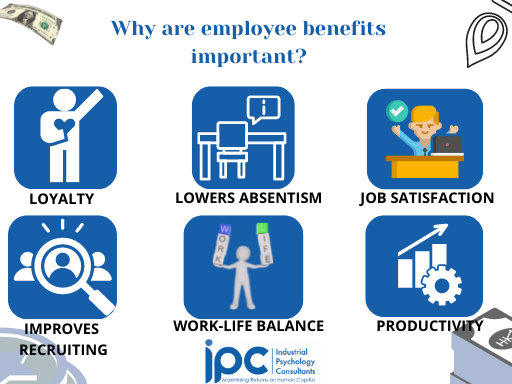One of the most effective ways of retaining and attracting top-performing employees is by having competitive employee benefits. Research done by the Harvard Business Review on Employee Benefits revealed that 75% of employees are more likely to stay with their employer because of their benefit program. Employee Benefits are the indirect and non-cash compensation paid to an employee. These benefits are given to employees over their salaries and wages. Employee Benefits can be put under two categories: mandatory and voluntary. Mandatory employee benefits are benefits that are required by the law, and they differ in each country. In some countries, employers must pay their employees Social Security as a mandatory benefit.
Employee benefits play a fundamental role in employee satisfaction which in turn have a very big impact on the organization. On the other hand, voluntary benefits are often referred to as perks or fringe benefits.
Employee Benefits
As mentioned earlier, employee benefits are non-wage, either mandatory or voluntary, offered to an employee. The purpose of employee benefits is to increase the economic security of employees and in doing so, improve worker retention across the organization. Employers with attractive benefits packages have a competitive advantage against other employers when it comes to attaining and retaining top talent. Having competitive employee benefits increases employee satisfaction which encourages required behaviours, achievements, values, and skills. Employee Benefits are directly tied up with employee satisfaction. Ignoring employee satisfaction will ultimately lead to a decrease in commitment. Thereby causing a lack of motivation, efficiency, and finally, productivity.
Why are employee benefits important?
Offering employee benefits has several advantages for business owners of all sizes, and the numbers prove it. If you want to attract and retain top talent, show your organizations worth, and increase morale, you must offer an attractive benefits package. Below is a list of reasons why employee benefits are important.
Advertisment
- They increase Job Satisfaction
A good benefits package shows that a company cares about its employees. Benefits such as paid time off, workplace perks, wellness programs, and tuition reimbursement can make employees feel valued. When employees feel valued, they become motivated to go above and beyond for their employers, increasing productivity. It is also important to note that job satisfaction from good benefits reduces turnover rates, which creates stable dynamics in an organization.
- They Lead to Work-Life Balance
Work-life balance, or the harmony between career and personal life, has become a fundamental part of 21st Century employees. Benefits such as vacation time, unlimited or generous paid time off, flexible hours, and the ability to work from home can help reduce employee stress and fatigue and prevent burnout. Employees who are awarded such benefits are likely to be more productive at work and home, and they tend to be high performers
- They increase productivity
For employees to perform their best, they need to be completely focused. Most of the time, they cant focus because they worry about how they can meet some of their needs. Most of the issues that employees worry about can be easily rectified by employers having competitive benefits.
- Increases Loyalty
An employer concerned about their employees well-being will build a loyal employee base. When your employees personal and professional lives are being cared for, they will want to build their careers in your company. 60% of employees say benefits are very important for their loyalty.
- Lowers Absenteeism
Some of the main causes of absenteeism are – health issues, low workplace morale, stress, childcare issues, and disengagement. Absenteeism makes employees demotivated, pushes back deadlines, and decreases their overall productivity. Health benefits give employees access to healthcare which is often a luxury to most individuals. Employees who have regular wellness exams, preventive care, prescription medications, and medical treatments will prioritize their jobs. If employees are encouraged to stay healthy and given the tools to do so, they are likely to feel more energetic, have fewer sick days, and be more effective at work. 43% of employees agree that having benefits helps them take lesser leaves.
- Improves Recruiting
It is a rule of thumb that job seekers consider the benefits package of a company before applying for a job. Even to the extent that 55% of employees would do a job that pays less but has amazing benefits packages. Research suggests that 57% of employees say benefits are their top consideration while applying for a job. Benefits are therefore pivotal in attracting and retaining skilled employees.

Types of employee benefits
Below is a list though not exhaustive, of some popular benefits found in many organizations. Employee benefits can be listed under two categories which are mandatory and voluntary. Mandatory benefits depend on the labour laws of the country in question.
Mandatory Benefits
- Paid leave, sick leaves, and vacation days
- Social Security
- Housing Allowance (In Zimbabwe)
- Transport Allowance ( In Zimbabwe)
Voluntary Benefits
- Tuition reimbursement and student loan repayment
- School Fees allowance
- Wellness programs
- Travel and spending expenses
- Remote work flexibility
- College grants and scholarships
- Disability benefits
- Paid training and development
- Gym Memberships
- Health Insurance
- Employee discounts, rewards, and bonuses
- Complimentary lunch
- Onsite relaxation services
In conclusion, for an employer to succeed and get top talent, they need to ensure that their benefits are up to standard.
Mutsawashe Musvaire is a Consultant at Industrial Psychology Consultants (Pvt) Ltd, a business management and human resources consulting firm.
Phone: +263 242 481946-48/481950
Mobile: +263 782 415 973
Email: mutsawashe@ipcconsultants.com
